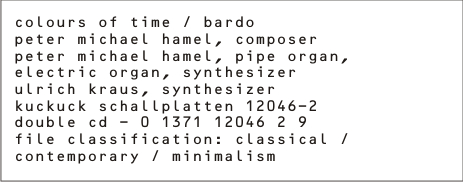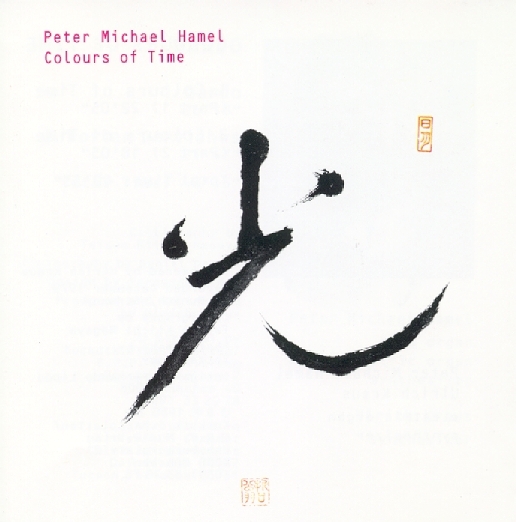 |
||||||||||||||||||||||||
 
Colours of Time (CD1) -ein elektronischer Raga in
zwei Teilen: indische Melodik über durchgehaltenem Grundton,
der „Drive“ entsteht durch die virtuosen, spiraligen Patterns
(Minimal-Musik). Ein früher Vorläufiger des heutigen Psychedelec
Trance. „Bardo“ (tibetisch für Zwischenzustand, z.B.
Phasen nach dem physischen Tod) setzt mit gewaltigen Kirchenorgel-Clustern
ein, die sich über einen zarten Dur-Akkord zur Stille hin auflösen.
„Dorian Dervishes“ bezieht sich auf den Trancetanz der
Derwische, hier in der Kirchentonart Dorisch gehaltene Gewebestrukturen.
Gelungene Klangverschmelzung von Syntheziser (Ulrich Kraus), elektrischer
und Konzertorgel (Hamel).
the projectPeter Michael Hamel's music flows from the grace and wisdom of countless cultures. In the 1970s, the German composer and writer went beyond the ideals of the experimental avant-garde to search for a more meaningful form of expression. As he explained in his influential book, Through Music to the Self, "It is the responsibility of spiritual music to learn from all musical traditions, to track down long-forgotten sources and to bring back into the limelight the original function of music—its links with the deepest in human experience." He does just that on Colours of Time and Bardo.These two albums from the early 1980s are available in the Celestial Harmonies duobox collection. The duobox is an innovative packaging format for double compact disks that places two CDs into a standard, single disk-sized jewel box by means of a modified inner compartment. Recorded in 1980, Colours of Time, is a two-part composition
for keyboard that surges with Eastern inspired melodies and time-suspending
patterns, reminiscent of
the artistBorn in 1947, Peter Michael Hamel studied music, psychology and sociology in Munich and Berlin. He continued his education abroad, spending three extensive periods in Asia. His knowledge of Eastern musical traditions had a profound effect not only on his own compositional style, but on his views concerning Western music as a whole. He shared his unconventional insights into music and its place in society in the influential book, Through Music to the Self. First published in 1976, the book discusses the transformational effects of music through the ages and calls for a new approach to composition in twentieth century Western music. Through Music to the Self has since been translated into several languages and has inspired countless composers and musicians worldwide. biographydiscographytracklist
|
||||||||||||||||||||||||
|
|
||||||||||||||||||||||||
 |

